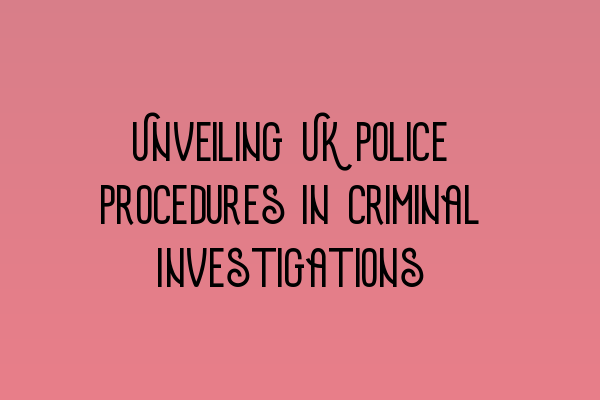Unveiling UK Police Procedures in Criminal Investigations
Welcome to SQE Criminal Law & Practice Law UK! In this blog post, we will dive deep into the intricacies of UK police procedures in criminal investigations. Understanding these procedures is crucial for aspiring solicitors and lawyers, as they form the foundation of the criminal justice system.
1. Arrest and Detention
When a crime is reported, the police carry out investigations to identify and apprehend suspects. The first stage is an arrest, where the police detain an individual on reasonable grounds for suspicion of involvement in a criminal offense.
During the arrest and detention process, the police must adhere to specific guidelines. These guidelines ensure that an arrestee’s rights, such as the right to legal advice and protection against self-incrimination, are upheld.
2. Search and Seizure
As part of the investigation, the police may need to search premises, vehicles, or individuals themselves. Such searches should only be conducted when authorized by law.
During the search and seizure process, the police must follow strict protocols to prevent any violations of privacy or illegal confiscation of property. Understanding the intricacies of search warrants and lawful search techniques is crucial for a successful criminal defense.
3. Questioning and Interrogation
Once arrested, the police have the authority to question and interrogate suspects to gather evidence. However, they must ensure that the interrogation process is carried out in a fair and legally sound manner.
This phase of the investigation raises questions related to the admissibility of evidence obtained during questioning. It is essential for solicitors and lawyers to understand the rules surrounding admissibility to effectively represent their clients.
4. Identification Procedures
Identification procedures play a crucial role in criminal investigations, particularly when identifying suspects or witnesses.
Understanding the various identification procedures, such as lineup identifications or identification parades, is essential for solicitors who may need to challenge the reliability of identifications made during the investigation.
5. Forensic Investigations
Forensic investigations involve the collection, analysis, and interpretation of scientific evidence to establish facts during a criminal investigation.
As a solicitor, having a basic understanding of forensic procedures will enable you to effectively navigate the complexities of scientific evidence and present a robust defense for your clients.
Stay Informed and Prepared with SQE Criminal Law & Practice Law UK
Knowing the ins and outs of UK police procedures in criminal investigations is essential for success in the legal profession. At SQE Criminal Law & Practice Law UK, we offer comprehensive SQE 1 and SQE 2 preparation courses to equip you with the knowledge and skills needed to excel in your legal career.
Take the first step towards your career in criminal law by enrolling in our SQE 1 preparation courses. These courses are designed to give you a solid foundation in key legal subjects and systematically prepare you for the SQE 1 exam.
Once you have successfully passed the SQE 1 exam, our SQE 2 preparation courses will provide you with the necessary skills to tackle the practical elements of criminal law.
Stay updated on the latest SRA SQE exam dates to ensure you are well-prepared for your upcoming exams.
Conclusion
Understanding the intricacies of UK police procedures in criminal investigations is vital to becoming a successful solicitor. By comprehending the arrest and detention process, search and seizure protocols, questioning and interrogation techniques, identification procedures, and forensic investigations, you’ll be well-prepared to navigate the complexities of criminal law.
Stay ahead of the game with SQE Criminal Law & Practice Law UK! Enroll in our courses and get ready to excel in your legal career.
